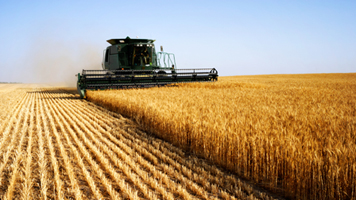Appreciating the New ‘Evolutionary’ Farm Bill
Category: Commentary, Farm Bill
 (AGWeek) – A very short list of changes. The new farm bill has many changes and revisions that will affect Upper Midwest farmers and ranchers. Here’s a quick look at a few of the most important:
(AGWeek) – A very short list of changes. The new farm bill has many changes and revisions that will affect Upper Midwest farmers and ranchers. Here’s a quick look at a few of the most important:
Gives more flexibility in deciding between Agricultural Risk Coverage and Price Loss Coverage.
Increases commodity loan rates for many crops. For example, the loan rate for wheat rises from $2.94 per bushel in 2014 to $3.37 per bushel.
Replaces the former Margin Protection Program for Dairy with Dairy Margin Coverage. The new DMC offers reduced premiums and a one-time signup bonus, among other things.
Increases funding for scab research. The crop disease hurts yields and quality of both wheat and barley.
Reduces funding for the Conservation Stewardship Program, through which ag producers earn payments to actively manage, maintain and expand conservation activities.
Allows a farmer’s cousins, nieces and nephews to qualify for commodity program payments.
Months of speculation, concern and effort. Months of meetings, press conferences and press releases. Months of public posturing and behind-the-scenes negotiations.
Now, finally, the United States has a new farm bill, one American agriculturalists generally are happy with — and one we think will be good for agriculture, consumers and our country overall.
Farmers and others in ag know what the farm bill is. For people who don’t:
The farm bill, the centerpiece of federal food and agricultural policy is updated about every five years. The old farm bill expired this fall when the U.S. Senate and House were unable to reconcile differences in their respective legislation, particularly a dispute over the Supplemental Nutrition Assistance Program, formerly known as food stamps.
The House-Senate bickering continued until an agreement on a compromise was reached in December. Almost anti-climatically, the two bodies approved the legislation by wide margins and President Donald Trump signed the new $867-billion, 807-page farm bill on Dec. 20.
The name suggests otherwise, but the farm bill isn’t only for farmers. It shapes ag and food policy on a wide range of topics, including ag research and marketing, crop subsidies, nutrition standards, and food assistance programs for low-income families.
Because the farm bill is so far-ranging and affects so many people, it has critics. They include some on the political right, who want to reduce subsidies, especially to larger farming operations, and some on the political left, who argue, among other things, that it should do less for agribusiness and more for small family operations. That latter view is shared by some farmers and ranchers.
Supporters, including most of mainstream U.S. agriculture, say the farm bill helps ensure a safe and affordable supply of nutritious food — and that whatever its blemishes, on balance it’s beneficial.
We think that will continue under the new farm bill. Agriculture Secretary Sonny Perdue called it “evolutionary,” rather than “revolutionary.” We agree; there don’t appear to be fundamental revisions to federal food and ag policy, or at least not many of them.
But there are important modifications that need to be watched. Portions of important programs such as Agriculture Risk Coverage and Price Loss Coverage, cornerstones of the federal safety net for farmers, have been changed.
Agweek will follow the revisions as they’re implemented in the months ahead.
New farm bills also bring snags, snafus, and surprises when they’re put into practice. Inevitably, at least a few aspects of the new legislation will lead to head-scratching confusion among farmers, politicians, U.S. Department of Agriculture officials and others in ag. Agweek will cover the puzzles as they develop, and we’ll try to help readers and viewers make sense of them.
But implementing the new farm bill is in the future. For now, let’s just enjoy having it. Imperfect as it may be, it nonetheless is good for farmers, ranchers, consumers, and our country

